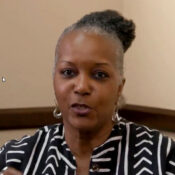
Speaker
Gale D. Johnson
Director of the Wisconsin Well Woman Program
Gale D. Johnson has been the director of the Wisconsin Well Woman Program (WWWP) in the Department of Health Services for more than 20 years. This statewide program is Wisconsin’s component of the National Breast and Cervical Cancer Early Detection Program administered by the Centers for Disease Control and Prevention (CDC). Johnson is a past chair of the CDC Council for Breast and Cervical Cancer Prevention and Control, and a member of the CDC’s National Breast and Cervical Cancer Early Detection and Control Advisory Committee. She is an active member of the Wisconsin Women of Color Network and the African American Health Network of Dane County, and has coordinated health programs for both organizations.
Speaking in
Nothing for Us Without Us: Experiences with Community-Academic Partnerships
Underserved communities are the same groups that are underrepresented in research.
Professor Eva Vivian, president of the African American Health Network and co-investigator with the UW Community-Academic Aging Research Network (CAARN), will discuss the historical trauma of Black Americans’ participation in research and how that broken trust has affected the community’s relationship to and attitudes towards future participation in research.
Only through greater inclusion of underrepresented groups in research can culturally tailored programs, practices and policy close the disparities gap. Researchers who seek to work with and in historically underrepresented communities have a responsibility to prioritize trust-building activities first and foremost.
CAARN brings together community and health system partners with academic researchers to conduct research that is of interest, need and priority to communities to improve the health of older adults and decrease health disparities. CAARN supports researchers in establishing credibility with underrepresented communities through attending community-sponsored events and demonstrating respect for, humility towards, and commitment to the community’s values and culture.
Three panelists will share their perspectives on key elements of a community-academic partnership and best practices for fostering and sustaining trust with underserved communities.
Attendees will leave with a better understanding of:
- How research has evolved in working with historically underrepresented communities
- How academics should approach underrepresented communities with research plans
- How community partnerships can direct research toward health equity and impact